
Daphne Koller is an Israeli-American computer scientist. She was a professor in the department of computer science at Stanford University and a MacArthur Foundation fellowship recipient. She is one of the founders of Coursera, an online education platform. Her general research area is artificial intelligence and its applications in the biomedical sciences. Koller was featured in a 2004 article by MIT Technology Review titled "10 Emerging Technologies That Will Change Your World" concerning the topic of Bayesian machine learning.
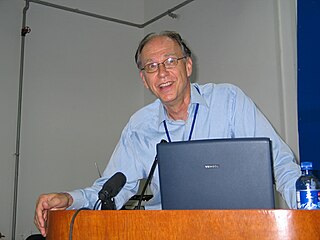
Michael Spencer Waterman is a Professor of Biology, Mathematics and Computer Science at the University of Southern California (USC), where he holds an Endowed Associates Chair in Biological Sciences, Mathematics and Computer Science. He previously held positions at Los Alamos National Laboratory and Idaho State University.

David Haussler is an American bioinformatician known for his work leading the team that assembled the first human genome sequence in the race to complete the Human Genome Project and subsequently for comparative genome analysis that deepens understanding the molecular function and evolution of the genome.

Russ Biagio Altman is an American professor of bioengineering, genetics, medicine, and biomedical data science and past chairman of the bioengineering department at Stanford University.

Temple Ferris Smith is an emeritus professor in biomedical engineering who helped to develop the Smith-Waterman algorithm with Michael Waterman in 1981. The Smith-Waterman algorithm serves as the basis for multi sequence comparisons, identifying the segment with the maximum local sequence similarity, see sequence alignment. This algorithm is used for identifying similar DNA, RNA and protein segments. He was director of the BioMolecular Engineering Research Center at Boston University for twenty years and is now professor emeritus.

Eugene Wimberly "Gene" Myers, Jr. is an American computer scientist and bioinformatician, who is best known for contributing to the early development of the NCBI's BLAST tool for sequence analysis.

Søren Brunak is a Danish biological and physical scientist working in bioinformatics, systems biology, and medical informatics. He is a professor of Disease Systems Biology at the University of Copenhagen and professor of bioinformatics at the Technical University of Denmark. As Research Director at the Novo Nordisk Foundation Center for Protein Research at the University of Copenhagen Medical School, he leads a research effort where molecular-level systems biology data are combined with phenotypic data from the healthcare sector, such as electronic patient records, registry information, and biobank questionnaires. A major aim is to understand the network biology basis for time-ordered comorbidities and discriminate between treatment-related disease correlations and other comorbidities in disease trajectories. Søren Brunak also holds a position as a Medical Informatics Officer at Rigshospitalet, the Capital Region of Denmark.
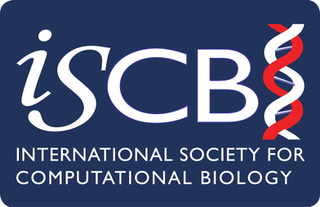
The International Society for Computational Biology (ISCB) is a scholarly society for researchers in computational biology and bioinformatics. The society was founded in 1997 to provide a stable financial home for the Intelligent Systems for Molecular Biology (ISMB) conference and has grown to become a larger society working towards advancing understanding of living systems through computation and for communicating scientific advances worldwide.
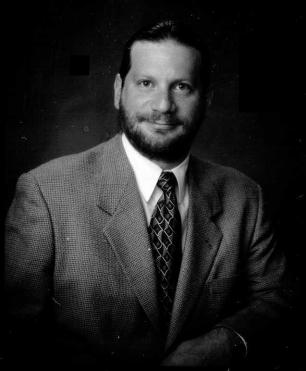
Lawrence E. Hunter is a Professor and Director of the Center for Computational Pharmacology and of the Computational Bioscience Program at the University of Colorado School of Medicine and Professor of Computer Science at the University of Colorado Boulder. He is an internationally known scholar, focused on computational biology, knowledge-driven extraction of information from the primary biomedical literature, the semantic integration of knowledge resources in molecular biology, and the use of knowledge in the analysis of high-throughput data, as well as for his foundational work in computational biology, which led to the genesis of the major professional organization in the field and two international conferences.
Trey Ideker is a professor of medicine and bioengineering at UC San Diego. He is the Director of the National Resource for Network Biology, the San Diego Center for Systems Biology, and the Cancer Cell Map Initiative. He uses genome-scale measurements to construct network models of cellular processes and disease.
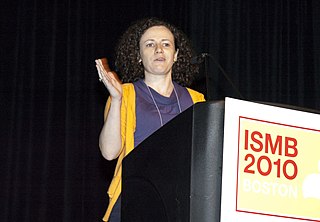
Olga G. Troyanskaya is a Professor in the Department of Computer Science and the Lewis-Sigler Institute for Integrative Genomics at Princeton University and the Deputy Director for Genomics at the Flatiron Institute's Center for Computational Biology in NYC. She studies protein function and interactions in biological pathways by analyzing genomic data using computational tools.
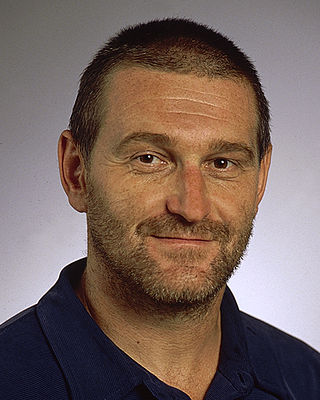
Pavel Arkadevich Pevzner is the Ronald R. Taylor Professor of Computer Science and Director of the NIH Center for Computational Mass Spectrometry at University of California, San Diego. He serves on the Editorial Board of PLoS Computational Biology and he is a member of the Genome Institute of Singapore scientific advisory board.

Aviv Regev is a computational biologist and systems biologist and Executive Vice President and Head of Genentech Research and Early Development in Genentech/Roche. She is a core member at the Broad Institute of MIT and Harvard and professor at the Department of Biology of the Massachusetts Institute of Technology. Regev is a pioneer of single cell genomics and of computational and systems biology of gene regulatory circuits. She founded and leads the Human Cell Atlas project, together with Sarah Teichmann.

Atul J. Butte is a biomedical informatics researcher and biotechnology entrepreneur. He is currently the Priscilla Chan and Mark Zuckerberg Distinguished Professor at the University of California, San Francisco. Since April 2015, Butte has serves as inaugural director of UCSF's Bakar Computational Health Sciences Institute.

Ruth Nussinov is an Israeli-American biologist who works as a Professor in the Department of Human Genetics, School of Medicine at Tel Aviv University and is the Senior Principal Scientist and Principal Investigator at the National Cancer Institute, National Institutes of Health. Nussinov is also the Editor in Chief for the journal PLOS Computational Biology.

Bonnie Anne Berger is an American mathematician and computer scientist, who works as the Simons professor of mathematics and professor of electrical engineering and computer science at the Massachusetts Institute of Technology. Her research interests are in algorithms, bioinformatics and computational molecular biology.
Cathy H. Wu is the Edward G. Jefferson Chair and professor and director of the Center for Bioinformatics & Computational Biology (CBCB) at the University of Delaware. She is also the director of the Protein Information Resource (PIR) and the North east Bioinformatics Collaborative Steering Committee, and the adjunct professor at the Georgetown University Medical Center.

Jill P. Mesirov is an American mathematician, computer scientist, and computational biologist who is the Associate Vice Chancellor for Computational Health Sciences at the University of California, San Diego. She previously held an adjunct faculty position at Boston University and was the associate director and chief informatics officer at the Eli and Edythe L. Broad Institute of MIT and Harvard.

Thomas Lengauer is a German computer scientist and computational biologist.
Daniel Mier Gusfield is an American computer scientist, Distinguished Professor of Computer Science at the University of California, Davis. Gusfield is known for his research in combinatorial optimization and computational biology.
















